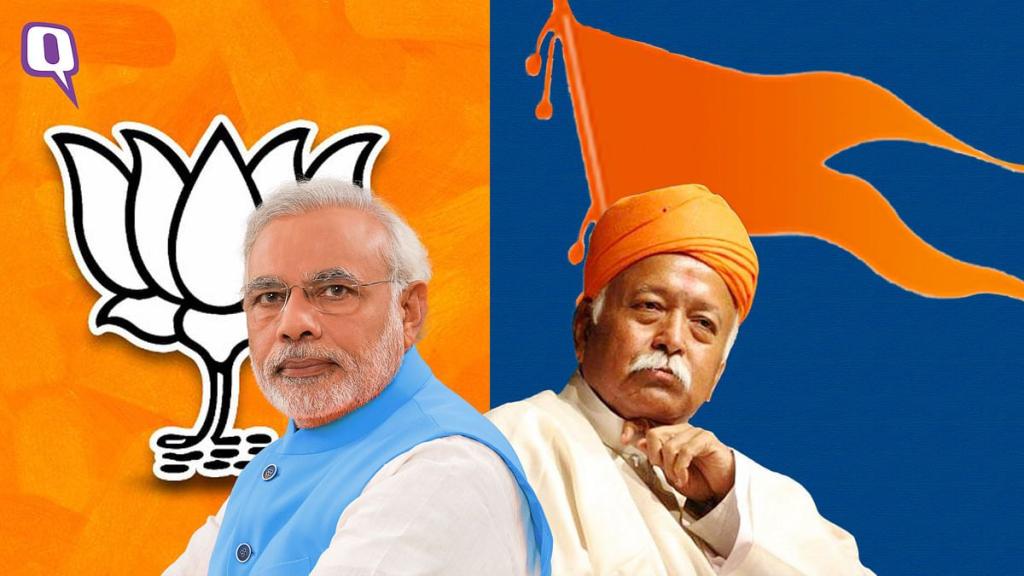RSS enters its centenary: A saga of uninterrupted fascist assault on modern India

The RSS has now entered its pre-centenary year. The 99th Vijayadashami or foundation day address of RSS supremo Mohan Bhagwat gives us some broad idea as to how the RSS is approaching its centenary. We must however always remember that the RSS remains a conspiratorial organisation at its core and in its essential operational mode and the ideological proclamations and public utterances only give us an outline. But given that the RSS now operates from an unprecedented position of power, it can afford to reveal a lot more, especially if we view the RSS as the coordinating centre or the bridge between the Modi government and the agenda and action of the wider Sangh brigade.
Hindu consolidation remains the central theme of the RSS and to achieve this goal it simultaneously plays the twin cards of victimhood as well as pride and power. Bhagwat talks about international developments selectively and twists them to suit his narrative of aggressive Islam and endangered Hindus. The year-long genocide of Palestinian children and women becomes an Israel-Hamas conflict and the popular upheaval in Bangladesh a violent coup bringing Islamic fundamentalist forces to power. In the same breath he talks about the growing danger of Bangladeshi infiltration and resultant population imbalance in India. This can only raise logical questions that Bhagwat will however never bother to answer.
The only source of authentic demographic data is the decadal census and the Modi government has been careful to avoid the 2021 census to keep the WhatsApp university rumour mills actively churning out fake population figures and projections. If there is infiltration happening across the border in the Modi era, the responsibility lies squarely with the Modi government which has the power and duty to guard the country's borders. And if Islamic fundamentalists are ruling in Bangladesh and the Hindu community there finds itself increasingly endangered, India should expect an influx of Bangladeshi Hindus and not Muslims. Anybody familiar with the Sanghi vocabulary would know that Hindus are described as refugees and the word 'infiltrator' is reserved exclusively for Bangladeshi Muslims. Yet the RSS continues to invoke the bogey of Bangladeshi infiltration to intimidate and mislead the common people of India.
Mohan Bhagwat would like us to believe that India has made great advances on all fronts during the Modi era even as almost all comparative global indices show India in a declining, if not alarming, situation. The Global Hunger Index has once again placed India in the 'serious' category in the global map of hunger, occupying the 105th rank among 127 countries, behind Bangladesh, Nepal and Sri Lanka. In Bhagwat's eyes, protest movements within India are all disturbances and obstacles. He has in fact described whole regions of India, 'Punjab, Jammu-Kashmir, Ladakh on the north-western border of the country; Kerala, Tamil Nadu on the sea border; and the entire Purvanchal from Bihar to Manipur' as disturbed. Characterising a region as 'disturbed' has often been the first step towards complete suspension of democracy and brazen violation of human rights. Bhagwat tells us that attempts to disturb and destabilise the country are gaining momentum from all directions.
Just as every dictator has a problem with dissent, the RSS has a problem with every identity and idea that challenges it or that the RSS has failed to appropriate in spite of all attempts. Unlike the period of Golwalkar, Bhagwat cannot possibly openly call for a Unitary State and Presidential system. But he believes that the RSS can dictate terms to regulate identities and the competitive nature of parliamentary democracy. He repeats his 2023 address to blame 'wokeism' and 'cultural Marxism' for creating 'artificial identities' and importing foreign ideas alien to what he calls India's cultural tradition and national interests. In Bhagwat's ideal India there will be no room for a dissenter like Gauri Lankesh, Stan Swamy, GN Saibaba or Umar Khalid - there will be no room for any 'alternative politics' which means every vision of social transformation, comprehensive justice and effective equality will be snuffed out.
Bhagwat says even gods do not protect the weak. In other words, attacks on minorities and marginalised groups are now sanctified as a divine duty. Assault on the weak, bulldozing of diversity, delegitimisation of dissent and conflation of majority with the nation - Bhagwat's 99th RSS anniversary address hardly seeks to camouflage this blueprint of a fascist order. Of course, while unveiling the centenary expedition of the RSS, Bhagwat is keenly aware of the impending Assembly elections in Maharashtra and Jharkhand. We are therefore reminded that the centenary of the RSS coincides with the 300th birth anniversary of Queen Ahilya Bai of the House of Holkar of the Maratha Confederacy known for her campaign of temple construction, the 150th birth anniversary year of Birsa Munda, stripped in the Sangh narrative of his anti-colonial history and the current context of the indigenous people's resistance against corporate plunder, and the centenary of the Satsang set up by Anukulchandra in Deoghar.
The organisation that had openly rejected the Constitution of independent India at the time of its adoption today sets the terms of the Republic's future as we observe the 75th anniversary of the adoption of the Constitution. This is the biggest calamity that Ambedkar had prophetically warned us about and the Republic and its people must summon all their innate strength and courage to overcome this calamity.
Dipankar Bhattacharya is General Secretary of the Communist Party of India (Marxist-Leninist) Liberation.